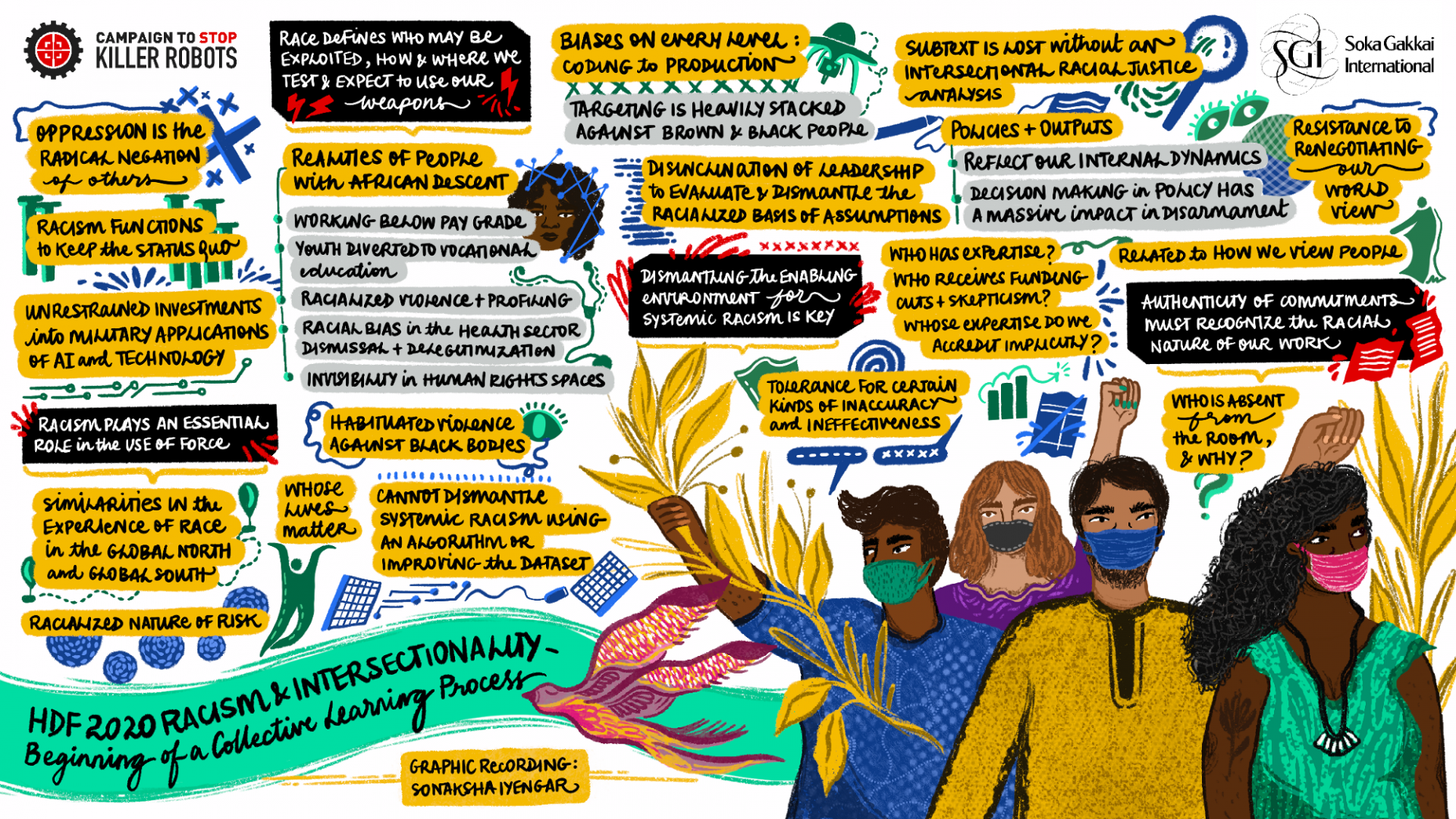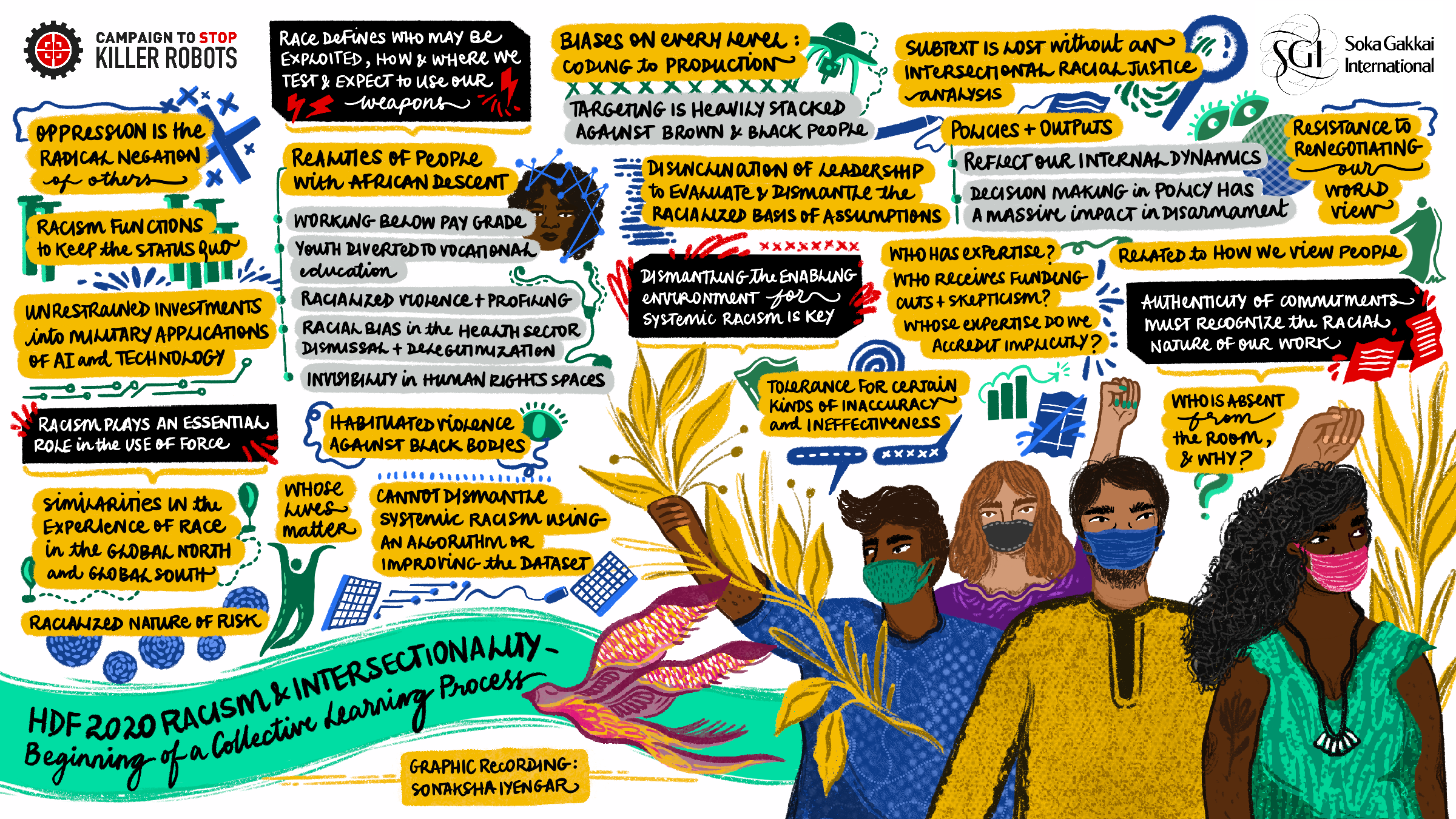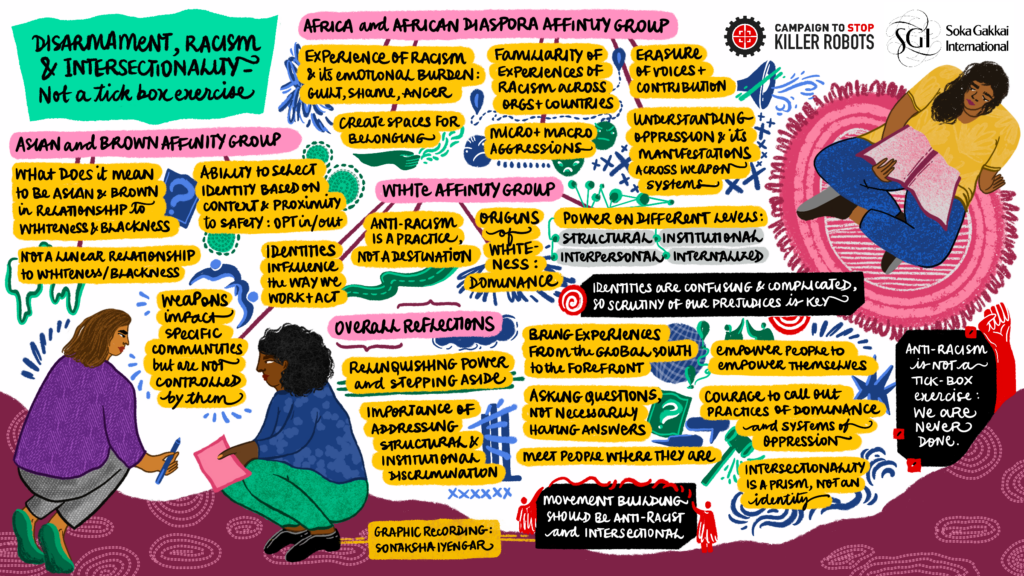
Bringing race and intersectionality to disarmament

A record turn-out of 115 people from 40 countries participated in Part One of the Humanitarian Disarmament Forum on 19-21 October, co-hosted by the Campaign to Stop Killer Robots and Soka Gakkai International. This was the ninth annual gathering of activists working across humanitarian disarmament since 2012 and the first Forum to be held virtually. It marked the beginning of a learning process that will see campaigners spend the coming year studying and discussing racism and how to adopt an intersectional approach to their collective work.
Hayley Ramsey-Jones of Soka Gakkai International and Mary Wareham from the Campaign to Stop Killer Robots opened the Forum by acknowledging the need for the humanitarian disarmament community to commit to being race-inclusive and adopting a wider intersectional approach. Drawing on this urgency, this HDF aimed to create spaces for learning and honesty about “the ethical disconnect between what we are trying to achieve in this world and how we go about getting there.” From acknowledging low levels of participation in United Nations meetings by non-governmental organisations (NGOs) from formerly colonised countries, to the unequal workplace structures and policies in our own organisations, humanitarian disarmament is not exempt from racism and inequality. The old adage of “it’s not about the weapons, but the people” is an important reminder for a community that focuses so heavily on arms issues, that sometimes we forget to look at who is in this field and how we work together.
Dominique Day, Chair of the UN Working Group of Experts on People of African Descent, took the virtual stage as the Forum’s keynote. With strong encouragement for the HDF, Day stressed the importance of self-analysis. She urged everyone to question the racialised assumptions that have come from a legacy of normalising white supremacy and violence against Black bodies; noting that otherwise, criticisms of racism and bias in disarmament and emerging technologies ring hollow. Without taking steps to understand what systemic racism looks like, we delegitimise and compromise our campaigns and work. Day urged the need to renegotiate our worldview and interrogate ourselves about the ways that we have been complicit in, and perpetuate, systemic and structural racism. She called on participants to recognise that the racialised nature of policy and decision-making has an impact on disarmament spaces because “how we act internally absolutely impacts and reflects our external priorities and vice versa.”
Judy Blair and Reagan Price, co-founders of Anti-Racism at Work (ARAW), provided a warm welcome with virtual open arms to participants, and acted as facilitators of breakout sessions throughout the HDF. They emphasised that anti-racist and intersectional work can be powerful tools, as the concept of intersectionality asks us “to examine how each of our identities shapes the power we have to determine our own realities, as well as the realities of others. More specifically, the term intersectionality describes the way people’s social identities overlap to expand or contract their power.”
Throughout all three days of the Forum, participants broke into three affinity groups (Asian/Brown/Indigenous/Mixed, Black, and White) for discussion sessions. During these affinity group sessions, participants shared their experiences of power, privilege, and oppression. Discussions considered the complexity of identity, and evaluated how to apply learnings to the broader disarmament movement.
The closing plenary brought participants together to report back from the affinity group discussions. Gen Hidari presented reflections from the Asian/Brown/Indigenous/Mixed group, which included the complexities of holding these identities in relational power to whiteness and blackness. The group discussed colonial history and impact, and the way intersectionality can inform disarmament work today. Diana Prado represented the Black group. She shared the need for everyone to question who is not at the table and why, and to make visible those who are often invisible. Exchanging experiences of power and oppression across countries was also a fundamental part of the learning. Maaike Beenes added the White group’s discussions about how identities influence the way we work, how to grow representation in the movement, and how privilege can be used to platform voices that are not being heard. All attendees were then invited to share their questions and personal reflections to the wider group.
In the final session, Blair and Reagan from ARAW left participants with important lessons for continuing anti-racism work. They highlighted that the perpetual nature of doing anti-racist and intersectional work calls for constant self-reflection, and that solidarity is only one part of the process. When we commit to learning, we learn to “know better to do better”. Co-hosts Ramsey-Jones and Wareham provided brief closing remarks on what to expect next in the collective learning process of the Humanitarian Disarmament Forum 2020-2021, with thanks to all who made the event possible and to participants for their engagement.

The event also featured moving musical performances from British soul singer-songwriter Amahla and Afro-Colombian rapper Katerin Moreno (also known as Kryn o soul). Amahla opened the HDF with a live performance of her original song “Apathy”, inspired by acknowledging the power of self-care and privilege of being able to turn off or turn away from overwhelming and difficult news. Kryn o soul ended the forum on a high note, with a rap about her personal experience of being Afro-Colombian, and the power of identity.
While the goal of humanitarian disarmament work is to prevent and mitigate human suffering from weapons, this field is not exempt from being complicit in, perpetuating, and suffering the inequalities of power. This HDF has only been the first step in the long and collective journey to do anti-racist work. As Day said in her keynote “[t]here is no scenario where we can dismantle systemic racism without dismantling the enabling environment for it, and we all live in that environment.” As a result, “[i]f we want to make change, we have to commit to do it. We have to commit to do it by any means necessary.”
This article was first published in the First Committee Monitor, Vol. 18, No. 3 on 25 October 2020.


